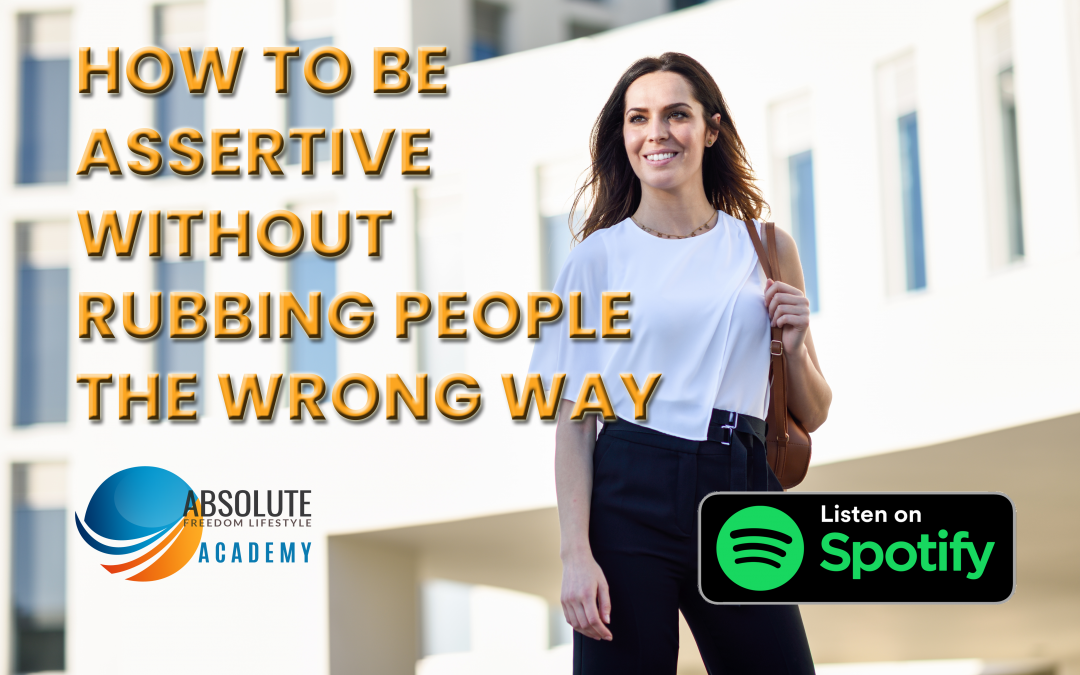How to Be Assertive Without Rubbing People The Wrong Way
Assertiveness is an important skill for effective communication as an adult. Assertiveness allows you to advocate for yourself and your needs in a healthy way. Some people interpret assertiveness as hostility or rudeness. Many factors can go into how assertiveness is interpreted or received. Let’s take a look at ways to advocate for yourself in an effective manner.
What Is Assertiveness?
Assertiveness is an interpersonal skill. It demonstrates your confidence and allows you to advocate for your needs, desires, and boundaries while being respectful towards others. You are taking care of yourself by looking out for yourself.
Steps To Being Assertive
- Ask for you want or need respectfully
- Speak your mind
- Remember that you are not responsible for the other party’s response
- You have a right to your feelings
- Use “I” statements when speaking
- Don’t apologize for your feelings or needs.
Delivery Matters
You can definitely be assertive without being rude. Tact is a thing. So is delivery. How you advocate for your needs can make a difference in how it is received. You can be assertive without being aggressive or impolite.
Using “I” statements to convey your needs helps prevent the person you are speaking to understand that you are stating your needs, and not placing blame. At times people may take assertiveness as rudeness when it is not. This is not your responsibility. Stay calm, keep it positive and constructive, but speak your needs.
Practice Practice
Assertiveness comes easy for some and is an anxiety-inducing challenge for others. The thing is, the more you do it the easier it gets. If being assertive does not come naturally for you start small. Practice stating your opinions in lower fidelity situations first.
Gain confidence as you go. Don’t apologize for stating your wants and needs. Know your boundaries and beliefs on bigger issues and be ready to peacefully and proactively advocate for your needs.
Dont’s
- Placing blame
- Sharing your wants and needs in a confrontational or aggressive manner
- Yelling or shouting
- Being unwilling to hear the other person out
Do your best to stay calm and be diplomatic. Also, understand that you can’t force someone to respect your assertive requests and behavior. You know what is best for you and only you can decide what to do if your requests are not honored. Stay true to your integrity and values.
How Assertive are You?
An important part of life skills is the development of assertiveness. Without it, you could feel disrespected or disregarded in relationships and career paths. Assertiveness is all about feeling confident in your ideas, thoughts, and beliefs that you can ask or demand what you want in a calm and effective manner.
Assertiveness is also about refusing to accept what you don’t want. For example, if someone cuts in front of you at the supermarket, do you call them on it or just keep quiet? If you don’t speak up, you probably leave the store feeling angry and frustrated.
If you’re an aggressive personality, you may react to the same situation by becoming over-angry and shouting at the person who cut in line. That type of behavior is unacceptable and can cause serious conflict.
You may have problems being assertive with those in authority – for example, parents, bosses or others who you feel are “above” you. You may not have the confidence to speak up around these people for fear that you’ll lose your job or be looked at as confrontational.
Ask yourself the following questions to gauge how assertive you are:
- Do you speak up when you disagree with someone?
- Do you do what’s right even though it goes against what others are doing?
- Would you remind a person about the money they borrowed and need to pay back?
- Can you ask for help if needed?
- Can you tell people when you’re disappointed in them?
- Do you tell someone if they’ve hurt your feelings?
- If someone is consistently late, do you tell him how it makes you feel?
- Can you refuse if someone asks you to do something wrong?
Think about people whom you really admire? Chances are they display the honorable quality of being assertive when needed. There’s a fine line between aggressiveness and assertiveness, but the consequences may be far-reaching.
Common sense can lead you away from being too aggressive so that feelings are hurt and relationships are lost. As you practice assertiveness in your daily life, you’ll become more adept at knowing when and where the line is crossed and being able to avoid it.
Learn all you can about assertiveness and apply the lessons where needed in your life. The self-esteem that comes from standing up for yourself and demanding that your rights be respected can transform your life and lead you to success.
The Difference Between Assertive and Aggressive Behavior
Many people struggle with exhibiting assertive behavior because they confuse assertiveness with aggressiveness. It may be especially difficult if you’ve maintained a passive personality most of your life. Now, you feel that you may hurt feelings and make enemies if you practice assertiveness.
If you’ve been an aggressive personality most of your life, it may be very difficult to contain your anger and harshness when dealing with others. You want your way and may not think it can happen by stepping down a rung or two on the ladder to assertive behavior.
The truth is that there is a line between both passive and assertive and aggressive and assertive behaviors. You may want to second-guess yourself about crossing the line – but, if you know the traits of an assertive personality versus passive and aggressive, you should be able to stand up for yourself without backing down or becoming angry and frustrated.
Here is a quick guide about using assertive rather than passive or aggressive behavior:
- Assertive – Clearly states an opinion, but is respectful of others’ beliefs.
Aggressive – Becomes angry and attacks the other person’s opinions.
Passive – Stay in the corner and don’t express opinions at all. - Assertive – Makes eye contact with others.
Aggressive – Glaring stares at the person.
Passive – Avoids making eye contact. - Assertive – Body language is relaxed and open.
Aggressive – Body language is rigid and may enter another’s space.
Passive – Body language is withdrawn and slumped. - Assertive – Considers him or herself as valuable as others.
Aggressive – He or she knows it all.
Passive – No self-value or self-esteem. - Assertive – Sets goals and reaches them.
Aggressive – May reach goals no matter what he says or does.
Passive – Doesn’t know how to set goals – or reach them.
As you can see by the above patterns, there’s a huge difference between each of the main personality traits. Assertive traits are admired by all, but they may not be easily accepted – at least, not at first. As you continue on the road to assertive behavior patterns, you’ll find it easier to transform from passive or aggressive to assertive. Just remember to think before you act.
There are exceptions to every rule, but if you make it a point to try and be sensitive to people’s feelings and notice body language and facial expressions, you’ll do well in developing an assertive personality style that will bode well for you.
GO DO IT!
Thank you again for reading and don’t forget to Enrol for the FREE online Course below: The Digital Nomad Secrets and to subscribe and leave your comments below.
– Steve Harrison –
THE DIGITAL NOMAD SECRETS
This $297- Online Course Is Available For FREE For the Next 30 Days Only!
This Exciting New Course Is A Step-By-Step Guide For Those Having To Work From Home, Or For The Aspiring Lifestyle Entrepreneurs To Live, Work And Play Anywhere In The World! Do you want to travel around the world and open yourself up to new things in life?
Well, listen up, I’ve got exactly what you’re looking for…
Click On This Link To Register For Free And Get Started Today >>> THE DIGITAL NOMAD SECRETS
Recommended Valuable Resource Material On This Subject
Click On The Links Below >>>
Including some FREE Resource material as well – check it out!

ABSOLUTE FREEDOM LIFESTYLE PODCASTS
Follow Us On SPOTIFY To Receive Our Weekly Podcasts
Investing in yourself is the key to living a life of meaning and purpose.
And to me, it is the best investment that you could ever make for yourself.

To Your Success
Steve Harrison
Founder of:
Absolute Freedom Lifestyle
email: stephen@absolutefreedomlifestyle.com











